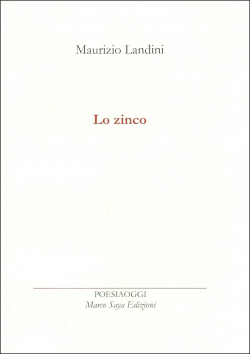Editorial
by Francesca Del Moro
Well I’ve been bound and gagged and I’ve been terrorized
and I’ve been castrated and I’ve been lobotomized
but never has my tormenter come in such a cunning disguise.
I let love in.
Nick Cave
Irrational and absorbing, love has always caught the attention of philosophers, who are constantly attempting to systematize it. An attempt anybody is inclined to make, maybe trying to find a handhold in the vortex of feelings that is likely to sweep us away. How to explain what is unexplainable by its very nature? Poets have been invited to cope with this task, which is doubly difficult considering that poetry is generally regarded as the expression of moods and feelings rather than of reasonings. Like Nick Cave, Miriam Bruni focuses on the power of love and the pain which unavoidably originates from it, in a few lines that graphically imitate a descent into the abyss. Both Rita Galbucci, with her typically harsh and dense style, and Roberta Lipparini issue a warning about the ambiguous nature of love: Rita draws attention to the impossibility of being really understood by someone else, although she doesn’t give up the search for a space in which to expand together with the beloved one, while Roberta, with her sweet lullaby, explores the faint border between love and the need for protection. Loredana Semantica reproduces the falling of a leaf and creates a conflict between the lightness of the verse and the power of burning words, in order to explore the double face of love, which is ardour and tenderness at the same time, ending up with a disquieting reference to asbestos. With a very short poem mid-way between Ungaretti and Leopardi, Elena Latini imagines the birth of love beyond the silence, leaving her lines open to several different interpretations. In his highly imaginative poem, Bill Dodd deals with the fusion of two people in a lasting feeling and, finally, Rodolfo Cernilogar offers us an amusing yet bitter analogy between love and material goods to be budgeted.
Loving
by Bill Dodd
Web of a spider
that irksomely
tickles
the careless hand
in that corner
of the sideboard.
The spider’s hanged
but the net
is implacable.
It looms behind the day
like an afterthought.
Do we want
to make confession?
We are shadows
each of the other
the other of each.
Happiness is irrelevant.
We are due to each other.
And when we undo each other
to fulfil
our bodies
time takes a leap.
Then memory:
to work!
What sweetness
tumescences
subtle lubrications.
Our hands, how many
unaccustomed shapes
they invent.
Then, eyes.
The space of eyes.
They tell the
tremendously
adult
nursery-rhyme of how well
we like each other.
Budget analysis
by Rodolfo Cernilogar
We should budget immaterial
goods. They will arouse
suspicion, like apocryphal
stakes, to depreciate.
Another thing are the material ones
with the prescribed amortizations,
easier to verify. It will be
my responsibility to provide details
in a supplementary note.
The start-up costs,
the brand’s value, the competitive
advantage of the know how.
Figures will prove us right:
we know that the final
sum will always be less,
it’s difference that certifies
love.
It burns
by Miriam Bruni
It burns
love
it drags
It leads
wakes
ties
Those who
hate pain
shouldn’t love
Shining bright
by Loredana Semantica
If I wheel like a leaf
if I fly upward
if I fade and come down
if I ignite if I burn
if I write as I play
if I play as I write
I owe it to you
my beloved leaf
my shining bright
spring star
heart forged in fire
most sacred sun
blessed
at thirty thousands degrees
of asbestos.
holding your breath
by Rita Galbucci
holding your breath
to talk in silence
to look for somebody
who can perceive you
not understand you
the dazzling crack of a whip
to move to the different level
with a little jump
that when you take it you say
how easy, it’s only leaving
an outburst
the necessary abandon
to the opening space
to expand
together with somebody
you have perceived
often a mistake
or a misunderstanding
because of yourself
you never find a way out
Imagine, beyond silence
by Elena Latini
Imagine, beyond silence,
another love.
I do not love you my love
by Roberta Lipparini
I do not love you my love
my darling
but I need you to shelter me
to protect me
from this graceless time
that is bursting with madness.
I do not love you my love
my soul
but give me a shelter
a protection
answer me with a caress
let yourself
be the landing
of my weakness.
And you too call me “love”
even if it is not love
it is the need of lying quietly
there, inside you.
Lo Zinco
by Maurizio Landini
With poetry we go
and meet death, day by day,
bit by bit, one for each thumb
the rosary’s beads.
Just a few poems, a very simple cover, no introduction: the book by Maurizio Landini looks utterly essential, and yet it is extremely rich, a perfect example of what Bukowski wrote about poetry, namely that it says too much in too short a time. Maurizio’s verses are curt, dense, they happen like an instantaneous and revealing glare, suddenly piercing our consciousness. The zinc of the title refers to the coating material of the coffin that, one year after his death, carried the remains of Maurizio’s father to the crematorium. Zinc is used to prevent the leakage of toxic substances deriving from putrefaction and therefore it takes on a “foscolian” significance. In fact, Maurizio’s verses move on like a journey that follows the path of the deceased with the same compassionate and loving look of the author of the Sepulchres. Along the way, poetry functions in turn as a weapon, an armour or as a faith, dispensing the nerve one needs to face death, “day by day, bit by bit”. And this is precisely what the poet is willing to show us: those bits, those days in which death makes its entry into life. In these pages we face the memory of his father, experienced with a pain that is private, scorching and discreet and which reaches its apex in the poem “Diseredi”; we face the sudden death during an attack, the slow extinction of passions that makes us die while leaving us technically alive; and we face death as the aspiration to feel nothing, which leads to the desire to hibernate under the snow. The last poem of the first part marks the dissolution of reality in the eyes blinded by the sun and serves as an introduction to the seven poems that, almost like musical movements, form the second part of the book: –sonnia. The assonance with the word “insomnia” (sleeplessness) suggests the idea of an arduous sleep, a sort of conscious somnambulism. It is a sleep that can’t be complete because the wounded eye can’t close anymore. Remindful of Magrelli’s Ora serrata retinae, this second part offers a very tangible insight into an oneiric and buñuelian world, to be looked at with the new sight of those who sleep with wounded eyes.
Maurizio Landini
Lo Zinco
Marco Saya Edizioni, 2012

